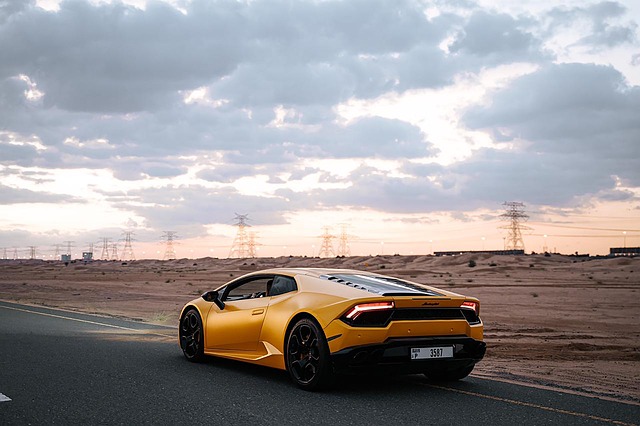Dubai's adoption of jet-powered vehicles signifies a groundbreaking shift in urban transportation, attracting global attention for its innovative approach. These sleek and speedy cars embody the city's commitment to sustainability and technological advancements, positioning Dubai as a jet car haven. The introduction of jet cars marks a significant step towards smarter, more sustainable transportation, revolutionizing daily commutes while contributing to environmental sustainability. Implementing these vehicles requires meticulous safety and environmental considerations, including advanced technology, rigorous testing, and comprehensive driver training. As jet cars become ubiquitous, Dubai solidifies its status as a leader in the global automotive industry, integrating cutting-edge technology into its urban fabric.
Dubai’s streets are undergoing a remarkable transformation as trailblazing jet-powered vehicles take to the roads, revolutionizing urban mobility. This article delves into the rise of these cutting-edge machines within Dubai’s automotive landscape, exploring technological innovations that promise faster travel times and enhanced efficiency. We analyze regulatory considerations and safety measures required for widespread adoption while examining the environmental impact of this exciting new era in jet car technology. Finally, we look ahead to the future of transportation in smart cities, where jet cars could play a pivotal role.
- The Rise of Jet-Powered Vehicles in Dubai's Automotive Landscape
- Technological Innovations: How Jet Cars Are Changing Urban Mobility
- Regulatory Considerations and Safety Measures for Jet Car Implementation
- Environmental Impact: Balancing Speed with Sustainability in Dubai
- The Future of Transportation: Exploring the Potential of Jet Cars in Smart Cities
The Rise of Jet-Powered Vehicles in Dubai's Automotive Landscape

Dubai, a city renowned for its innovation and forward-thinking approach, has embraced the future of automotive excellence with the rise of jet-powered vehicles on its streets. This exciting development marks a significant shift in the region’s transportation landscape, captivating both locals and visitors alike. With sleek designs and unparalleled speed, jet cars are becoming a common sight in Dubai, symbolizing the city’s commitment to staying at the forefront of technological advancements.
The integration of jet-powered vehicles into Dubai’s automotive scene is not just a trend but a strategic move towards sustainability and efficiency. These cutting-edge machines offer a unique blend of power and luxury, attracting attention from automotive enthusiasts worldwide. As Dubai continues to embrace eco-friendly initiatives, jet cars play a crucial role in reducing carbon emissions while providing an extraordinary driving experience, solidifying the city’s position as a global hub for automotive innovation and a jet car haven.
Technological Innovations: How Jet Cars Are Changing Urban Mobility

In Dubai, jet cars are not just a futuristic concept but an emerging reality that redefines urban mobility. These innovative vehicles harness cutting-edge technology to offer unprecedented speeds and efficiency on city streets. Jet power, traditionally associated with aviation, is now being integrated into automotive design, pushing the boundaries of what’s possible in personal transportation. With advanced propulsion systems, jet cars promise smoother acceleration, higher top speeds, and even the potential for vertical take-off and landing, transforming the way residents and tourists navigate Dubai’s bustling metropolis.
The introduction of jet cars to Dubai streets signifies a significant shift towards smarter and more sustainable urban mobility. These vehicles not only enhance commute times but also contribute to a cleaner environment through efficient engine designs that reduce carbon emissions. As Dubai continues to innovate, jet cars are poised to become a common sight, revolutionizing daily commutes and making the city even more dynamic and forward-thinking in terms of transportation technology.
Regulatory Considerations and Safety Measures for Jet Car Implementation

Implementing jet-powered vehicles on Dubai’s streets is an ambitious venture that necessitates a thorough examination of regulatory considerations and safety measures. As one can imagine, introducing such cutting-edge technology into urban areas demands stringent standards to ensure both public safety and environmental protection. The regulatory framework must address specific challenges posed by jet cars, including noise pollution control, air quality management, and strict guidelines for driver licensing and vehicle maintenance.
Safety is paramount in this context. Jet cars operate at high speeds and require advanced collision avoidance systems, robust structural designs, and comprehensive training programs for drivers. Regular inspections and rigorous testing protocols should be enforced to maintain the safety integrity of these vehicles. Moreover, emergency response plans must be tailored to handle the unique challenges posed by jet-powered transportation, including specialized rescue equipment and rapid reaction teams.
Environmental Impact: Balancing Speed with Sustainability in Dubai

In the heart of Dubai, where skyscrapers kiss the sky and innovation knows no bounds, jet-powered vehicles are not just a futuristic concept but an exhilarating reality. As these high-speed machines zip through the city’s bustling streets, they spark excitement among residents and visitors alike. However, amidst the allure of speed and power, there lies a crucial consideration: environmental impact. Balancing the thrill of jet car racing in Dubai with sustainability is essential to ensure that this unique automotive excellence does not come at the cost of the emirate’s natural heritage and clean air.
The introduction of jet cars in Dubai has sparked debates about air pollution and noise pollution, especially as the city continues to grow. Yet, efforts are underway to make these high-performance vehicles more eco-friendly. Advanced technologies, such as hybrid engines and sustainable materials, are being explored to reduce emissions and minimize the environmental footprint. Moreover, strict regulations and responsible initiatives from local authorities play a pivotal role in promoting greener practices within the automotive industry, ensuring that Dubai’s streets remain not just jet-powered but also harmonious with its pristine environment.
The Future of Transportation: Exploring the Potential of Jet Cars in Smart Cities

The integration of jet-powered vehicles into Dubai’s urban landscape marks a significant step towards the future of transportation, where speed and innovation converge in a smart city setting. Jet cars, once confined to science fiction, are now becoming a tangible reality, offering a glimpse into an exciting new era of mobility. With their high-speed capabilities and advanced technology, these vehicles have the potential to revolutionize daily commuting and urban logistics in Dubai and beyond.
Imagine streets filled with sleek, cutting-edge jet cars that seamlessly navigate through traffic, reducing travel times significantly. The concept of on-demand transportation takes on a whole new dimension when jet cars become an integral part of a city’s infrastructure. This technology promises to enhance the efficiency of urban mobility, cater to growing populations, and contribute to the overall sustainability of smart cities like Dubai. As these vehicles continue to evolve, they may just become the game-changer in transforming our transportation landscape.
Dubai’s embrace of jet-powered vehicles represents a daring leap forward in automotive excellence, seamlessly integrating cutting-edge technology into its urban fabric. As these high-speed machines zip through the city, they usher in a new era of mobility, promising efficient and dynamic transportation solutions. However, balancing environmental concerns with the allure of speed remains paramount. With careful regulatory oversight and continued innovation, jet cars have the potential to become a defining feature of smart cities worldwide, including Dubai, revolutionizing urban commuting experiences.
